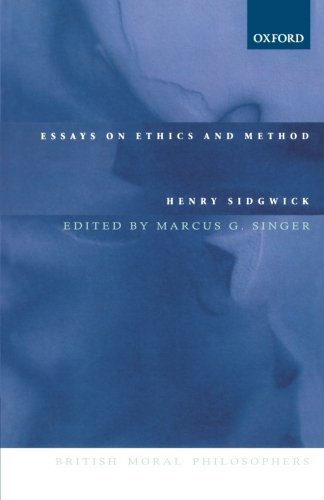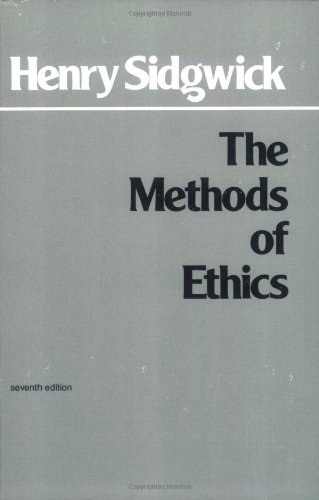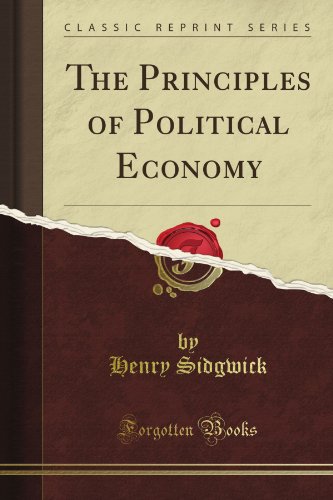Background
Sidgwick was born on May 31, 1838 in Skipton, England, where his father, the Reverend W. Sidgwick (d. 1841), was headmaster of the local grammar school, Ermysted's Grammar School. His mother was Mary Sidgwick, née Crofts (1807-1879).



(THE ELEMENTS OF POLITICS is part of an impressive catalog...)
THE ELEMENTS OF POLITICS is part of an impressive catalog of books by the English philosopher and educator Henry Sidgwick. First published in 1898, this two-part work is a collection of twenty essays, all of which represent his ideas related to the scope and method of politics, fundamental conceptions of politics and general principles of legislation, inheritance and property rights, contracts and remedies for wrongs, the maintenance of government as well as law and morality. Throughout his work, Sidgwick addressed politics and all its inherent problems with acuity, genuine concern, and the enduring rationale he brought to all his writings. HENRY SIDGWICK (1838-1900) was a prominent scholar at Trinity College and a distinguished Professor of Moral Philosophy at Cambridge. As the quintessential Victorian, he was the perfect 19th Century English academic (although he temporarily lost his fellowship in 1869 over his refusal to make a religious oath; he was re-elected in 1885). Additional works include Principles (1883), Methods of Ethics (1874), and Edgeworth (1877).
http://www.amazon.com/gp/product/1596052236/?tag=2022091-20

( "The work of a master in the subject, who in a few preg...)
"The work of a master in the subject, who in a few pregnant pages has sketched out skillfully and judicially the history of Greek, of medieval, and of English reflections on the aims and laws of human conduct." --William Wallace (at time of first publication)
http://www.amazon.com/gp/product/0872200604/?tag=2022091-20

(This volume provides a selection of the shorter writings ...)
This volume provides a selection of the shorter writings of the great nineteenth-century moral philosopher Henry Sidgwick. Sidgwick's monumental work The Methods of Ethics is a classic of philosophy, and this new volume is a fascinating complement to it. It will be a rich resource for anyone interested in moral philosophy or the development of modern analytical philosophy.
http://www.amazon.com/gp/product/0198250231/?tag=2022091-20

( Henry Sidgwick (1838-1900) is best known for his work T...)
Henry Sidgwick (1838-1900) is best known for his work The Methods of Ethics, which went through seven editions and served as the principal textbook in ethics for a half century. His fame as a moral philosopher has tended to obscure the true range of his contributions to other subjects, many of which are hidden away in periodicals and encyclopedias, now accessible to only the most determined researchers. These two volumes of previously uncollected essays and reviews give the reader a welcome opportunity to explore these lesser-known but no less important shorter writings. Gathered together for the first time are many valuable documents in ethics, the history of philosophy, economics, political philosophy, psychology, the philosophy of history, and psychical research. The book reviews provide Sidgwick's comments upon most of the important philosophical texts published in the last third of the nineteenth century. The collection shows just how central Sidgwick was both to the evolution of British analytical philosophy and to the development of philosophy as a discipline in its own right. --a comprehensive collection of his lesser-known philosophical writings, gathered from a wide range of sources --includes reviews of many of the era's major philosophical publications
http://www.amazon.com/gp/product/185506586X/?tag=2022091-20

(This book was originally published prior to 1923, and rep...)
This book was originally published prior to 1923, and represents a reproduction of an important historical work, maintaining the same format as the original work. While some publishers have opted to apply OCR (optical character recognition) technology to the process, we believe this leads to sub-optimal results (frequent typographical errors, strange characters and confusing formatting) and does not adequately preserve the historical character of the original artifact. We believe this work is culturally important in its original archival form. While we strive to adequately clean and digitally enhance the original work, there are occasionally instances where imperfections such as blurred or missing pages, poor pictures or errant marks may have been introduced due to either the quality of the original work or the scanning process itself. Despite these occasional imperfections, we have brought it back into print as part of our ongoing global book preservation commitment, providing customers with access to the best possible historical reprints. We appreciate your understanding of these occasional imperfections, and sincerely hope you enjoy seeing the book in a format as close as possible to that intended by the original publisher.
http://www.amazon.com/gp/product/B00ASWFUBE/?tag=2022091-20

( This Hackett edition, first published in 1981, is an un...)
This Hackett edition, first published in 1981, is an unabridged and unaltered republication of the seventh (1907) edition as published by Macmillan and Company, Limited. From the forward by John Rawls: In the utilitarian tradition Henry Sidgwick (1838-1900) has an important place. His fundamental work, The Methods of Ethics (first edition 1874, seventh and last edition 1907, here reprinted), is the clearest and most accessible formulation of what we may call 'the classical utilitarian doctorine.' This classical doctrine holds that the ultimate moral end of social and individual action is the greatest net sum of the happiness of all sentient beings. Happinesss is specified (as positive or negative) by the net balance of pleasure over pain, or, as Sidgwick preferred to say, as the net balance of agreeable over disagreeable consciousness. . . .
http://www.amazon.com/gp/product/0915145286/?tag=2022091-20

(Excerpt from The Principles of Political Economy The cha...)
Excerpt from The Principles of Political Economy The character and scope of this treatise I have endeavoured to explain fully in the introductory chapter; it remains for me here to acknowledge my debts to the works that have chiefly aided me in composing it. After J. S. Mill's book, from which I first learned political economy, and on which the present work must be understood to be primarily founded, I believe that I owe most to Jevons' Theory of Political Economy, the leading ideas of which have been continually in my thoughts - though I have had occasion to dissent from many of Mr Jevons' particular opinions. I am also considerably indebted - in spite of still more fundamental disagreement - to Cairnes' Leading Principles of Political Economy: and also to the Economics of Industry, by Mr and Mrs Alfred Marshall, together with some papers by Mr Marshall on the theory of Value diagrammatically treated, which have been privately lent to me. About the Publisher Forgotten Books publishes hundreds of thousands of rare and classic books. Find more at www.forgottenbooks.com This book is a reproduction of an important historical work. Forgotten Books uses state-of-the-art technology to digitally reconstruct the work, preserving the original format whilst repairing imperfections present in the aged copy. In rare cases, an imperfection in the original, such as a blemish or missing page, may be replicated in our edition. We do, however, repair the vast majority of imperfections successfully; any imperfections that remain are intentionally left to preserve the state of such historical works.
http://www.amazon.com/gp/product/1440054215/?tag=2022091-20
economist professor utilitarian philosopher
Sidgwick was born on May 31, 1838 in Skipton, England, where his father, the Reverend W. Sidgwick (d. 1841), was headmaster of the local grammar school, Ermysted's Grammar School. His mother was Mary Sidgwick, née Crofts (1807-1879).
Sidgwick was educated at Rugby (where his cousin, subsequently his brother-in-law, E. W. Benson - afterwards archbishop - was a master), and at Trinity, Cambridge, where his career was a brilliant one. In 1875 he was appointed praelector on moral and political philosophy at Trinity, in 1883 he was elected Knight-bridge professor of moraf philosophy, and in 1885, the religious test having been removed, his college once more elected him to a fellowship on the foundation.
Sidgwick was active in promoting higher education for women, primarily through founding Newnham College, Cambridge (1871), of which his wife, Eleanor Balfour, became principal in 1892. A member of the Metaphysical Society, he was also interested in psychical phenomena and was a founder and first president of the Society for Psychical Research in 1882.
In philosophy Sidgwick followed the Utilitarianism of John Stuart Mill (1806-1873) and adopted the ethical principle known as the categorical imperative from Immanuel Kant (1724-1804). He drew on the views of both men for his first and major work, The Methods of Ethics. By a method, Sidgwick meant the rational process of arriving at a means of making ethical decisions. All possible attempts at method, he believed, could be summarized by three approaches: egoism, Utilitarianism, and intuitionism. Egoism refers to the theory that justifies an action in terms of the happiness it produces in the agent of the act. Utilitarianism seeks to contribute to the happiness of all persons affected by the act. Intuitionism indicates that ends other than happiness might be acceptable, and that guidelines other than those that promote happiness might be suitable means to an end. Sidgwick argued that neither the first nor the last could, by itself, supply an adequate basis for rational conduct. Instead he proposed a system of “universalistic hedonism, ” which, in a manner parallel to Kant’s categorical imperative, sought to reconcile the apparent conflict between the pleasure of self and that of others.
(Excerpt from The Principles of Political Economy The cha...)
( "The work of a master in the subject, who in a few preg...)
( Henry Sidgwick (1838-1900) is best known for his work T...)
( This Hackett edition, first published in 1981, is an un...)
(This book was originally published prior to 1923, and rep...)
(THE ELEMENTS OF POLITICS is part of an impressive catalog...)
(This volume provides a selection of the shorter writings ...)
Brought up in the Church of England, Sidgwick drifted away from orthodox Christianity, and as early as 1862 he described himself as a theist, independent from established religion. For the rest of his life, although he regarded Christianity as "indispensable and irreplaceable -
looking at it from a sociological point of view, " he found himself unable to return to it as a religion.
In politics Sidgwick was a Liberal, and became a Liberal Unionist in 1886.
Member of the General Board of Studies (1882-1899), member of the Council of the Senate of the Indian Civil Service Board, member of the Local Examinations and Lectures Syndicate, chairman of the Special Board for Moral Science.
She was an activist for the higher education of women, Principal of Newnham College of the University of Cambridge, and a leading figure in the Society for Psychical Research.
